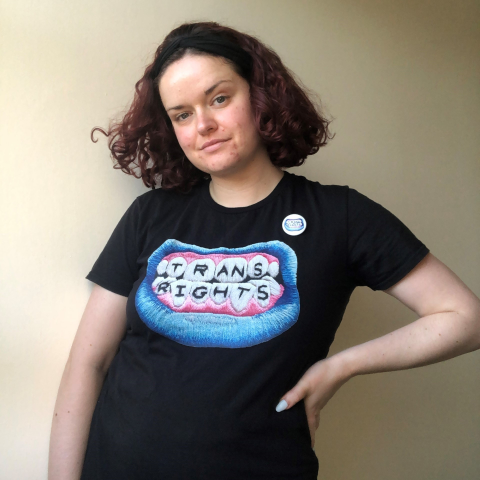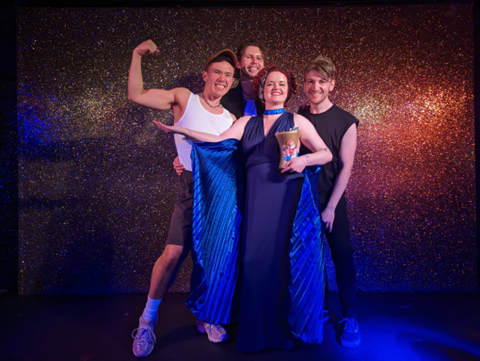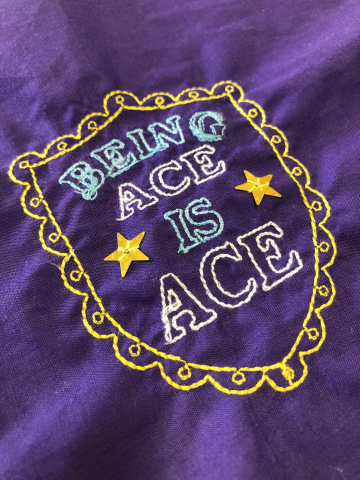This Pride Month, we are talking to LGBTQ+ members of the King’s College London community to find out what Pride means to them. If you would like to share what Pride means to you, please email the team at diversity@kcl.ac.uk.
Rosanna McNamara is a Student Content Manager within the Student Knowledge & Information Team. She has an MA (Distinction) from King’s in Christianity and the Arts, and is an active member of Proudly King’s, the staff LGBTQ+ network. You can check out her trans liberation embroidery on Etsy.
Rosanna spoke to us about asexuality.
I don’t know exactly what I am
Like many people, I did a lot of introspection during lockdown. I have a male partner, but I’ve never recognised myself in the ways that other straight people talk about relationships and desire. I did a lot of research, asked a lot of questions, and explored the possibility that I’m asexual.
Straight sexual attraction (known as allosexuality) is often conflated with ‘human nature’, especially in the media on shows like Love Island. For those of us who don’t experience the world that way, that framing feels very exclusionary.
In the current cultural climate, women can’t win: we’re shamed if we’re sexual and if we’re not.
Asexuality is about attraction, not behaviour
My research has taught me that there are many different types of asexuality, which can be shorted to ‘ace’. The ace community encompasses people who don’t experience romantic attraction (aromantic) and those who don’t experience sexual attraction (asexual).
Many of us also exist in the grey area between feeling sexual and asexual, for example by identifying as demi-sexual, which is the experience of needing to know someone very well before experiencing sexual attraction to them.
These labels are fluid and people change them a lot. When I first started exploring asexuality I found labels liberating, but now I can find them restrictive: even within the ace community, there can be a tendency to force people into boxes.
I feel happiest describing myself as queer. For the past two years I’ve taken vogue dance classes at the Rainbow Nation Dance Academy, which is a queer-run company. I love it, and it feels like home.
What does Pride mean to you?
Pride is a riot and a fight. Yes, it’s fun too, but ultimately it’s about people coming together to combat oppressive forces within our society.
I’m acutely aware of the ways I’m privileged: I’m white, cis and in a romantic relationship with a man. This year, I want to use my voice to fight for more marginalised members of the LGBTQIA+ community. I’m volunteering at London Trans+ Pride and working for better King’s representation at UK Black Pride through Proudly King’s.
Pride is about celebrating and protecting the great plurality of human experience. We should all be equal in our differences.
Learn more about asexuality:
- Yasmin Benoit’s. She’s a Black, ace activist and is the founder of the #ThisIsWhatAsexualLooksLike movement
- Ace by Angela Chen
- The Asexual Visibility and Education Network | asexuality.org
- Asexual Outreach
- Ace Week 2022: October 23-29
My Etsy shop, where I also make queer art with donations to charity: RosannaMcNamara – Etsy UK
Get involved & make a difference this Pride Month
- Join our LGBTQ+ staff network Proudly King’s or attend one of their events here.
- Check out our Pride student news article which is full of useful links here.
- Pride Month Step-Out challenge! Join Proudly King’s & King’s Sport in a 28, 06,69 step challenge in June and July to commemorate LGBTQ+ Pride Month and summer activities whilst keeping active. Sign up on the King’s Move app from 12th June here!
Want to Learn more about Equality, Diversity & Inclusion at King’s College London?
- Found out more by visiting our Equality, Diversity & Inclusion at King’s pages.
- Follow us on Twitter.
- Email the team at diversity@kcl.ac.uk


